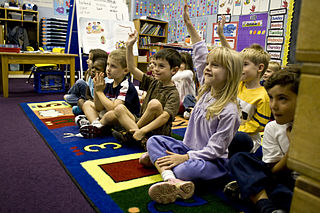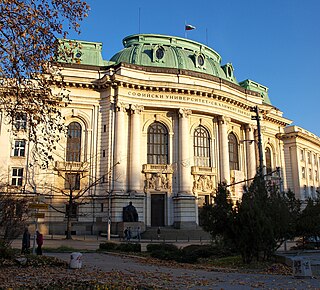
Gymnasium is a term in various European languages for a secondary school that prepares students for higher education at a university. It is comparable to the British English terms grammar school and sixth form college and to US English preparatory high school. Before the 20th century, the gymnasium system was a widespread feature of educational systems throughout many European countries.

Kindergarten is a preschool educational approach based on playing, singing, practical activities such as drawing, and social interaction as part of the transition from home to school. Such institutions were originally made in the late 18th century in Bavaria and Alsace to serve children whose parents both worked outside home. The term was coined by the German Friedrich Fröbel, whose approach globally influenced early-years education. Today, the term is used in many countries to describe a variety of educational institutions and learning spaces for children ranging from 2 to 6 years of age, based on a variety of teaching methods.
State schools or public schools are generally primary or secondary schools that educate all children without charge. They are funded in whole or in part by taxation. State funded schools exist in virtually every country of the world, though there are significant variations in their structure and educational programmes. State education generally encompasses primary and secondary education.
Tenth grade or grade 10 is the tenth year of school post-kindergarten or the tenth year after the first introductory year upon entering compulsory schooling. In many parts of the world, the students are 15 or 16 years of age, depending on when their birthday occurs. The variants of 10th grade in various countries are described below.

Education in Hungary is predominantly public, run by the Ministry of Human Resources. Preschool kindergarten education is compulsory and provided for all children between three and six years old, after which school attendance is also compulsory until age of sixteen. Primary education usually lasts for eight years. Secondary education includes three traditional types of schools focused on different academic levels: the Gymnasium enrols the most gifted children and prepares students for university studies; the secondary vocational schools for intermediate students lasts four years and the technical school prepares pupils for vocational education and the world of work. The system is partly flexible and bridges exist, graduates from a vocational school can achieve a two years program to have access to vocational higher education for instance. The Trends in International Mathematics and Science Study (TIMSS) rated 13–14-year-old pupils in Hungary among the best in the world for maths and science.
Education in Romania is based on a free-tuition, egalitarian system. Access to free education is guaranteed by Article 32 in the Constitution of Romania. Education is regulated and enforced by the Ministry of National Education. Each step has its own form of organization and is subject to different laws and directives. Since the downfall of the communist regime, the Romanian educational system has been through several reforms.
A modern language is any human language that is currently in use. The term is used in language education to distinguish between languages which are used for day-to-day communication and dead classical languages such as Latin and Classical Chinese, which are studied for their cultural or linguistic value. SIL Ethnologue defines a living language as "one that has at least one speaker for whom it is their first language".
Education in Spain is regulated by the Ley Orgánica 8/2013, de 9 de diciembre, para la mejora de la calidad educativa that expands upon Article 27 of the Spanish Constitution of 1978. The Spanish education system is compulsory and free for all children aged between 6 and 16 years and is supported by the national government together with the governments of each of the country's 17 autonomous communities.
Educational stages are subdivisions of formal learning, typically covering early childhood education, primary education, secondary education and tertiary education. The United Nations Educational, Scientific and Cultural Organization (UNESCO) recognizes nine levels of education in its International Standard Classification of Education (ISCED) system. UNESCO's International Bureau of Education maintains a database of country-specific education systems and their stages.

Education in Bulgaria is overseen by the Ministry of Education and Science. Since 2012, compulsory education includes two years of preschool education, before children start primary school. Education is compulsory until age of 16. Education at state-owned schools is free of charge, except for the higher education schools, colleges and universities.

Education in Mauritius is managed by the Ministry of Education & Human Resources, which controls the development and administration of state schools funded by government, but also has an advisory and supervisory role in respect of private schools. The Tertiary education is maintained by the Ministry of Tertiary Education, Science, Research and Technology. The government of Mauritius provides free education to its citizens from pre-primary to tertiary levels. Since July 2005, the government also introduced free transport for all students. Schooling is compulsory up to the age of 16. Mauritian students consistently rank top in the world each year for the Cambridge International O Level, International A and AS level examinations.
Selectividad is the popular name given to the Spanish University Admission Tests, a non-compulsory exam taken by students after secondary school, necessary to get into University. Students must take six 90-minute written exams over three days in June or September, consisting of common and specific subjects taken in "Bachillerato". Selectividad exams are set by the Public Universities of each autonomous community and allow students access to the Spanish university system.
Education in Jamaica is primarily modeled on the British education system.
Education in Croatia is a right defended by Article 66 of the Constitution which states that everyone is entitled to free compulsory education under equal conditions and in accordance with their aptitudes. Education is mandatory for children aged 6 to 14.
This article is about education in Seychelles and its evolution from private mission schools to compulsory public education in the modern system.
Education in Trinidad and Tobago is free and compulsory between ages 5 and 16. Trinidad and Tobago is considered one of the most educated countries in the World with a literacy rate exceeding 98%. This exceptionally high literacy rate can be attributed, in part, to free tuition from Kindergarten (Pre-School) to University.
The Spanish Baccalaureate is the post-16 stage of education in Spain, comparable to the A Levels/Higher (Scottish) in the UK, the French Baccalaureate in France or the International Baccalaureate. It follows the ESO. After taking the Bachillerato, a student may enter vocational training or take the "Selectividad" tests for admission to university.